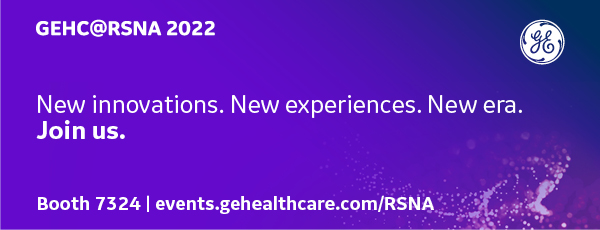Digitization and artificial intelligence (AI) are an era-defining reality in today’s healthcare environment. AI is no longer just a possibility in healthcare’s distant future. It can seek, collect, store, and standardize medical data; assist with repetitive tasks; and support clinicians with fast, accurate, and precise clinical information—today.
AI’s introduction into the healthcare space was slow compared to other industries and the consumer market, but several factors helped speed the digital transformation in healthcare, including the COVID-19 pandemic. The global pandemic highlighted the critical need for health systems and clinicians to have the right medical data in the right place at the right times to provide care.
Specifically, in radiology, the availability and possibility of medical images and remote-work environments have always been a challenge, but the urgency of the pandemic spurred the adoption of new solutions. Healthcare organizations made significant changes with unprecedented speed to continue delivering top-quality care in a changing landscape, including turning radiology telehealth and remote patient monitoring into a reality.
Discovering the true impact of technology on healthcare
Healthcare leaders in medical imaging are seeking to adopt even more digital and AI solutions, as they have helped to increase efficiency and throughput within imaging departments—where there are high levels of staff burnout and an increasing demand for healthcare workers. The World Health Organization predicts the demand for healthcare workers will rise to 18.2 million across Europe by 2030.*
As an industry leader in imaging, GE Healthcare is rising to the challenge by creating digitization and AI tools to build a world that works better for healthcare—ready to meet the needs of today and tomorrow. GE Healthcare recognizes that intelligent technology applications can help improve efficiencies that then help to improve patient care and the lives of healthcare providers. Therefore, it is GE Healthcare’s vision to be the leading innovator in precision health, elevating its customers’ ability to deliver on their mission of providing the best patient care possible.
“We've seen the beginning of a true transformation in the healthcare industry with the power of AI,” Scott Miller, Chief Marketing Officer of Imaging, GE Healthcare. “We’re committed to accelerating that momentum and will continue to push the boundaries of what technology can do for patients and our customers. We understand that to drive improved clinical outcomes with efficiency and speed, we have to make maximum use of technology, combining better hardware with software and algorithms leveraging AI and machine learning, to deliver improved analytics and digitization.”
Enhancing clinical insights with radiology AI
Radiology is ideally suited for AI applications due to its data-driven nature. AI allows radiologists to streamline image reading, helps to inform their clinical decision-making and help drive improved diagnostics, revolutionizing patient care and empowering solutions. New algorithms using AI and machine learning deliver insights aimed at faster abnormality detection and diagnostics, better care quality, and more efficient clinical workflows.
Improving clinical outcomes is highly dependent on clinicians getting the right image the first time during patient exams—and the increasing demand for imaging services makes accuracy that much more important. Radiology has experienced a 31 percent increase in magnetic resonance imaging (MRI) procedures between 2007 and 2018[1], illustrating the necessity of accuracy and an efficient workflow to handle increasing demand. Additionally, about 20 percent of MRI exams need a follow-up or repeat exam.[2]
Radiologists have traditionally been challenged by the inherent compromise between MRI image quality and scan time (better image quality generally necessitates longer scan times). However, new deep-learning MR image reconstruction techniques produce high-quality images with shorter scan times. GE Healthcare’s deep learning reconstruction algorithm for MRI is leveraging the raw data in the MRI reconstruction process to deliver finer image detail and improved image quality so clinicians can feel more confident with evaluations and diagnoses.
“GE Healthcare is focused on developing radiology innovations that can help radiologists improve productivity with AI tools and embedding technology that supports a streamlined workflow and insightful clinical images,” said Rekha Ranganathan, Chief Digital Officer (acting), GE Healthcare and General Manager, Imaging Solutions.
Radiologists can provide more precise and personalized care with automated workflows and AI-powered imaging to help address efficiency challenges. AI tools in radiology are continually being developed that will supplement the radiologist’s expertise and enable them to positively impact patient care.
Digitizing and improving operational efficiencies with AI tools
As the demand for medical imaging continues to grow, imaging modalities such as X-ray remain one of the most fundamental types of diagnostic imaging. Painless, non-invasive, convenient, and fast—these are some of the reasons why X-ray contributed to more than 80 percent of the estimated 4.2 billion imaging procedures performed in 2019.[3]
Quickly triaging patients toward the right treatment path can be critical for a patient’s outcome. However, with limited staff to read X-ray images, the time to diagnosis can be delayed. New AI-based automated tools can assist technologists with correct anatomical positioning and protocol selections at the time of the scan, and auto-rotate images to save time later for reading radiologists. Additionally, to improve the triage of urgent cases, an on-device X-ray AI algorithm developed by GE Healthcare also automatically analyzes images upon acquisition for critical findings such as pneumothorax. The most urgent cases are flagged for prioritized radiologist review.
Medical imaging exams with more complex scanning protocols and processing requirements, such as computed tomography (CT), are also performed on a regular basis, and the volume of medical imaging data in these exams has also grown exponentially due to advances in imaging technology. Radiology departments are therefore looking to increase efficiencies and operate with maximum productivity and detailed resource planning in CT. AI-based CT tools are designed to help alleviate the time demands on radiology workflows, providing standardization and tools to help improve operational efficiencies.
Optimizing imaging workflows with solutions to accommodate the requirements for various exams is challenging. However, the adoption of AI applications is growing, and impacts can be seen in areas such as exam setup, protocol management, patient positioning, and, indeed, workflow optimization.
Developing scalable digital and AI solutions for sustainability and efficiency
Advanced technologies are changing the way radiologists work—including where they can work. Imaging processing software can now be used with AI and digital technologies on any workstation, onsite or virtually, while typically it was only available on a system’s local workstation. AI-based reconstruction algorithms across imaging equipment can be accessed through advanced visualization and image processing software solutions that are server- or cloud-based and enable enterprise-wide use. A single user can work with images from multiple imaging systems or workstations, and the number of simultaneous users can be scaled to meet the needs of the department.
AI is recognized as a tool that can help radiologists perform their jobs more efficiently, more accurately, and with time savings—but most importantly, without slowing them down. The true test of an AI application is whether it can seamlessly and invisibly integrate into the user workflow with little additional training or time added to the radiologists already demanding schedule.
Integrating AI solutions at scale across radiology and optimizing health system operations
The growing GE Healthcare's Edison™ Ecosystem cornered on the Edison Digital Health Platform* will open up a new way to acquire healthcare applications that can scale and evolve with a provider’s needs. It was created to give users a single marketplace that facilitates access to AI applications. It is also a hub to develop, house, test, and deploy AI applications. Embedded within existing workflows, applications deployed on the platform can integrate and assimilate data from disparate sources and apply analytics or advanced algorithms to generate clinical, operational, and financial insights for providers and institutions. One of the most unique aspects of this platform is that it is being designed to connect the best innovations in AI with healthcare providers in an efficient and scalable way.
Just as AI tools can be delivered at scale to imaging equipment across a health system, insights taken from equipment data can serve as a resource to maximize operational performance. Administrators can build long-term plans for current and projected medical asset needs using data-supported evidence and a standardized approach with centralized data inputs. A physical equipment inventory—combined with a computerized maintenance management system can help administrators visualize important data and better illustrate asset value and lifecycle management.
Administrators can also rely on historical data and simulation algorithms to generate predictive analytics, such as the availability of staff, equipment, and hospital beds. Lastly, tracking data on actual equipment usage helps to inform capital purchase decisions and maximize utilization based on patient needs. This rigorous digital approach helps coordinate the building blocks for an optimized operation.
Digitalization and AI deliver imaging efficiency across the healthcare enterprise
AI innovation is supporting a new era of digital radiology infrastructure that integrates medical technology, clinical insight, and workflow to benefit the radiology staff, patient outcomes, and the larger hospital ecosystem.
When successfully implemented, AI and other digital solutions can be smart, easy to use, and remotely deployed across entire healthcare enterprises. Integrating these solutions at the department, hospital, and enterprise levels can help care facilities identify opportunities to reduce hospitalizations, reduce cost, and increase patient and staff satisfaction.
RELATED CONTENT
- Read more on ‘Trending AI and Digital Solutions in Radiology—current adoption, applications and continuing developments’
- Read more on ‘Elevating Digital Healthcare to Connect Devices, Aggregate Data and Empower People’
- Read more on Improving Efficiencies Across Sites with Digital Distributed Imaging
- Explore GE Healthcare’s imaging digital solutions to increase operational efficiencies in the radiology department.
DISCLAIMERS
Not all products or features are available in all geographies. Check with your local GE Healthcare representative for availability in your country.
*Technology in development that represents ongoing research and development efforts. These technologies are not products and may never become products. Not for sale.
REFERENCES
[*] Transforming healthcare with AI: The impact on the workforce and organizations | McKinsey
[1] IMV 2018 MR Market Outlook report
[2] Andre et al J Am Coll Radiol 2015;12:689-695
[3] 2019 Global Imaging Outlook Report, IMV, https://imvinfo.com/


